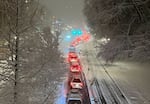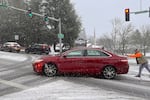The Portland Bureau of Transportation and the Oregon Department of Transportation had both been preparing for a winter storm since early this week when forecasters predicted a light dusting of snow on Wednesday. But neither department was ready for the historic snowfall that ground Portland-area traffic to a halt Wednesday evening.

Drivers creep along NW Naito Parkway near Burnside Bridge in Portland, Feb. 22, 2023. Commutes throughout the Portland area were hampered by heavy snowfall, Feb. 22, 2023.
Prakruti Bhatt / OPB
“Everything about this — the timing, the magnitude, the direction — all of it, the forecasters got wrong,” Portland Bureau of Transportation spokesperson Dylan Rivera said Thursday morning. “Even if we had a warning, this would have been an epic event. And now, an epic event with no warning? That’s a double whammy.”
Oregon Department of Transportation spokesperson Don Hamilton said plows were ready to go, along with vehicles to spread salt and de-icer.
“And then we got hit, we got hit hard by this storm,” he said. “We got hit with ice, slush on the road. That turned to ice with almost 11 inches of snow on top of that. So this was a big storm.”
On Wednesday morning, weather forecasters were still predicting no more than a few inches of snow at high altitudes in the city. That took a turn in the afternoon when snow began sticking in downtown Portland.
“We stopped getting forecasts, and started getting play-by-plays,” Rivera said. “We were told in the moment that two inches had accumulated across the city, and it was only expected to continue.”
PBOT immediately asked employees to extend their day shifts from 3 p.m. to 6 p.m. and prepped a second shift of staff to start at 11 p.m. Snowplows, de-icing vehicles, and other emergency crews began spreading across the city.
But the response came too late.
By rush hour, Portland’s main roads were clogged with unprepared commuters. Cars unable to maneuver the snowy streets blocked some lanes of traffic and TriMet began canceling routes due to stuck buses. Many drivers opted to abandon their cars and walk home in the quickly-accumulating snow.
PBOT was tasked with removing those abandoned vehicles Thursday morning. Rivera said it’s city policy to ensure that at least one lane of traffic along critical emergency routes remains open, to allow for police, fire, and other emergency vehicles to pass through. Cars left in downtown Portland and along routes to Oregon Health & Science University that were actively blocking roadways had to be towed Wednesday.
While Rivera expressed sympathy for drivers who felt like they had no other choice but to abandon their vehicles Wednesday, he said they will still be responsible for the cost to tow those vehicles — estimated at around $128. Rivera initially said drivers would also be cited, a $270 ticket. Later Thursday afternoon, he announced that PBOT would not be ticketing people who abandoned their cars Wednesday.
“To be fair, the public didn’t have any warning about this that would have allowed them to be prepared,” said Rivera. “But neither did the city.”

In the Sylvan Hills area of Southwest Portland, a driver receives some help getting up Barnes Road. Feb. 22, 2023.
Kristyna Wentz-Graff / OPB
If PBOT had been given more than an hour’s warning that a heavy snowstorm was coming through Portland, Rivera said, the city’s response would have looked far more proactive.
“We would have gladly put 55 snow plows on the street by noon Wednesday if we knew more than two inches of snow were coming Wednesday,” he said. “But if we did that with just a dusting of snow on the forecast, that would look like a waste of taxpayer dollars.”
Moving forward, Hamilton said the primary goal for state transportation crews is to make sure the main highways in the metro area and along the coast are cleared, including Interstate 5, Interstate 205, Interstate 84 and U.S. 101.
“Those roads have had a lot of problems,” he said. “We’ve had trees down. We’ve got obviously snow and a lot of ice. Our priorities are going to be for emergency service vehicles for commuters, and certainly for freight and business.”
With temperatures expected to remain below freezing Thursday, Rivera said PBOT is focused on plowing and de-icing main roads. PBOT won’t be clearing residential streets.
City Commissioner Mingus Mapps, who oversees the transportation agency, said he is “very happy” with PBOT’s response to the storm.
“As everyone saw, the streets were a mess yesterday, and our crews were impacted by gridlock as well,” Mapps said Thursday morning. “Today, they are prioritizing critical roads and public safety.”
Mapps said he opted to walk to his home in Southeast Portland after the Wednesday afternoon City Council session downtown.
“It took about an hour,” Mapps said. “It was beautiful though.”
Hamilton said the best thing people can do now is avoid driving altogether until the weather turns warmer.
“It’s snowy. The roads are dangerous. And it’s cold,” he said. “So I think that this is a good day just to stay off the roads and be safe.”
Editor’s note: This story has been updated to reflect the Portland Bureau of Transportation’s decision not to cite drivers who abandoned their cars Wednesday night.
